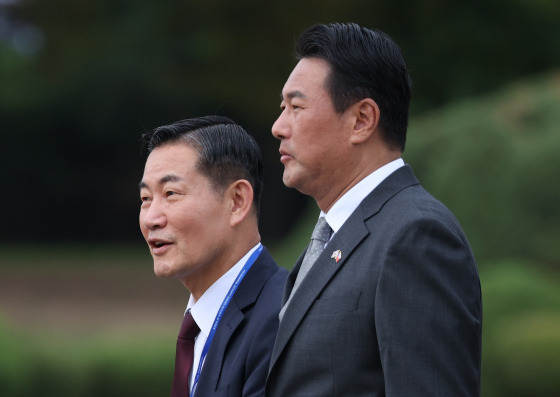National Security Adviser Shin Won-sik said Monday that North Korea could carry out its seventh nuclear weapons test around the time of the U.S. presidential election in November.
In an interview with Yonhap News TV, the national security adviser said the North would likely decide when to conduct another test after weighing “the strategic advantages and disadvantages” it could incur.
Shin noted that the South Korean government believes the North “still needs to conduct several additional technical tests to miniaturize its nuclear weapons.”
He also said that he believes the time frame of the potential test includes the period “before and after the U.S. presidential election.”
The national security adviser said South Korea and the United States are “closely monitoring” developments in the North that could indicate preparations for a nuclear test and that the allies “place the utmost importance” on the possibility.

Shin added that North Korean state media reports on leader Kim Jong-un’s visit earlier this month to a previously unknown uranium enrichment facility appear aimed at “attracting domestic and foreign attention by highlighting the threat posed by the North’s nuclear weapons program ahead of the U.S. presidential election.”
Shin also criticized Im Jong-seok, who served as chief of staff under former President Moon Jae-in, for suggesting that the two Koreas could “exist as they currently do” without pursuing reunification.
“I think it’s extremely regrettable and dangerous that certain political figures are abruptly sympathizing with North Korea’s claims and making anti-constitutional claims,” Shin said.
Im’s comments at a ceremony marking the 6th anniversary of the joint inter-Korean declaration of Sept. 19 came several months after the North Korean leader said his regime should regard the South as its “irreconcilable enemy.”
Shin also argued that the Yoon administration is pursuing “the sort of inter-Korean relationship that is not focused on merely putting on a political show,” thus indirectly criticizing the conciliatory policies of the preceding Moon administration.
The national security adviser further argued that the “political show [put on by the Moon administration] allowed the North time to further develop its nuclear weapons” and “eventually led to more instability on the Korean Peninsula.”
“This government is focused not on running a political charade, but rather on inter-Korean dialogue based on principle and sincerity,” he said.
Shin added that the “door to dialogue is always open to the North” and that the Yoon administration “maintains its stance that it is always ready to conduct talks on any topic.”
However, the national security adviser emphasized that the North “can never earn what it desires through provocations and threats” and expressed his hope that Pyongyang “takes this opportunity to realize that it can only achieve its aims through compromise and negotiations.”
President Yoon called on the North to engage in dialogue with the South during a speech delivered on Aug. 15
Shin also called on the North to cease sending trash-laden balloons over the demilitarized zone (DMZ) into the South, calling its activities “immature and lowly provocations.”
The national security adviser assessed that the North was focusing on sending balloons “because it knows it has few other choices to carry out direct provocations in light of the South Korean military and government’s strong defense posture.”
Shin added that the South Korean government has focused on removing the balloons after they land, rather than intercepting them mid-air, because of the possibility that stronger pre-emptive measures “could result in more problems.”
The national security adviser repeated the Joint Chiefs of Staff’s assessment that recent fires ignited by the North Korean balloons resulted from their attached timers malfunctioning and failing to separate their payloads from the balloons before they landed.
Shin added that ongoing trilateral security cooperation between Seoul, Washington and Tokyo “is the result of their common understanding regarding defense” and that “no changes in leadership or their domestic politics will alter this trend.”
BY MICHAEL LEE [lee.junhyuk@joongang.co.kr]



![Green card interviews used as decoy for ICE arrests U.S. Immigration and Customs Enforcement (ICE) agents arrest a man after a hearing at an immigration court in Manhattan, New York, on Oct. 27. [REUTERS]](https://www.koreadailyus.com/wp-content/uploads/2025/12/1226-ICE-100x70.jpg)
